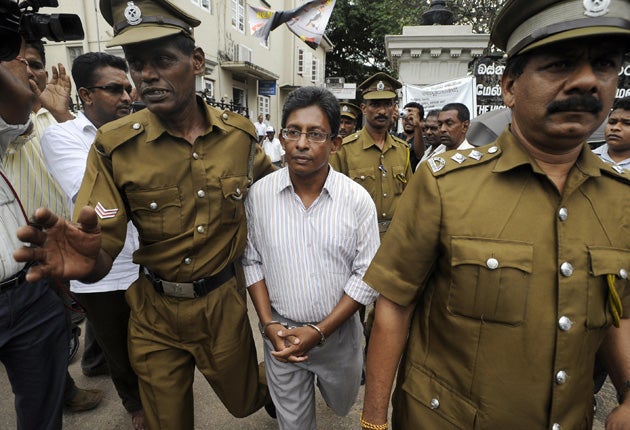Sri Lanka jails journalist who criticised war policy
Twenty years for writer who was hailed by President Obama as a hero facing persecution

A Sri Lankan reporter, recently named by US President Barack Obama as an example of the way journalists are persecuted around the world, has been sentenced to 20 years in jail for writing articles critical of the government's military operations.
In a case that campaigners say highlights a campaign of intimidation against the country's independent media, JS Tissainayagam was jailed after a court decided he had breached harsh anti-terror laws. He is the first journalist to be convicted under the Prevention of Terrorism Act.
Mr Tissainayagam, an experienced columnist who wrote for several publications including the now defunct Northeastern Monthly magazine, had written several articles in 2006 and 2007 in which he accused the government of withholding food and other essentials from Tamil-majority areas as a weapon of war. The court decided that his articles broke the law because they were designed to create agitation between the Tamil minority and the Sinhala majority. "The constitution guarantees media freedom, but no one has a right to deliberately publish false reports that would lead to communal violence," said the government prosecutor Sudarshana de Silva.
Last night campaigners condemned the decision and called for Mr Tissainayagam, who was arrested in May last year, to be set free. Yolanda Foster of Amnesty International, which has named the journalist a prisoner of conscience, said he had been jailed purely for expressing his opinions. "Our position is that he should be released, and we would also call on the government to repeal [this legislation]," she said.
Mr Tissainayagam's lawyer insisted that his client, who was also accused of having links to Tamil rebels, was innocent of the charges, and said he would appeal. The journalist signed a confession but retracted it, saying it had been written under duress.
"He was never a racist and he at no time tried to arouse hatred," said his lawyer, Anil Silva, describing Mr Tissainayagam as a champion for human rights. "This is a good lesson for all journalists to be cautious when writing in future. He lost his job in the 1980s when talking about labour union rights. Now, he lost his freedom when talking about Tamil rights."
Earlier this year, President Obama highlighted the detention of the Sri Lankan columnist when the White House issued a statement to mark Press Freedom Day. "In every corner of the globe, there are journalists in jail or being actively harassed: from Azerbaijan to Zimbabwe, Burma to Uzbekistan, Cuba to Eritrea," he said. "Emblematic examples of this distressing reality are figures like JS Tissainayagam in Sri Lanka, or Shi Tao and Hu Jia in China."
Campaigners say the case of Mr Tissainayagam highlights the pressure that independent journalists in Sri Lanka have been under since the election of the country's current President, Mahinda Rajapaksa. He was determined to end the country's long-running civil war and crush the rebel Liberation Tigers of Tamil Eelam, and campaigners say the government has been equally resolute about refusing to allow criticism.
Press campaigners say that at least 14 journalists and other media workers have been killed since the beginning of 2006, and scores have fled the country. While officials claim the Sri Lankan media is independent, many reporters privately admit to a degree of self-censorship.
Tamil reporters are particularly fearful of angering the government. A number of international journalists who have angered the government have been either expelled or threatened with expulsion. In June, the government said it would re-establish a powerful press council with the authority to jail journalists it found guilty of defamation or inaccurate reporting.
"There is no press freedom in this country today, even after the war is over," Sirithunga Jayasuriya, a local media rights activist, told Reuters.
Subscribe to Independent Premium to bookmark this article
Want to bookmark your favourite articles and stories to read or reference later? Start your Independent Premium subscription today.

Join our commenting forum
Join thought-provoking conversations, follow other Independent readers and see their replies